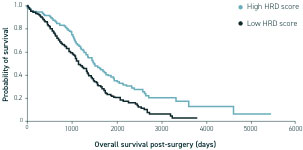

The frequency of elevated scores suggests that a significant proportion of all breast tumor subtypes may carry defects in the homologous recombination DNA repair pathway. The HRD scores showed strong correlation with BRCA1/2 deficiency regardless of breast cancer subtype. In multivariable analyses the HRD-mean score captured significant BRCA1/2 deficiency information not captured by the three individual scores, or by clinical variables ( P values for HRD-Mean adjusted for HRD-LOH: P = 1.4 × 10 -8 HRD-TAI: P = 2.9 × 10 -7 HRD-LST: P = 2.8 × 10 -8 clinical variables: P = 1.2 × 10 -16). A combined score (HRD-mean) was calculated using the arithmetic mean of the three scores. BRCA1/2 deficient tumors were identified with BRCA1/2 mutations, or BRCA1 promoter methylation, and loss of the second allele of the affected gene. BRCA1 promoter methylation was observed almost exclusively in triple negative breast cancer. ResultsīRCA1/2 deleterious mutations were observed in all breast cancer subtypes. Next-generation sequencing based assays were used to generate genome wide SNP profiles, BRCA1/2 mutation screening, and BRCA1 promoter methylation data. MethodsĢ15 breast tumors representing all ER/HER2 subtypes were obtained from commercial vendors. This study examines the frequency of BRCA1/2 defects among different breast cancer subtypes, and the ability of the HRD scores to identify breast tumors with defects in the homologous recombination DNA repair pathway. Three DNA-based homologous recombination deficiency (HRD) scores (HRD-loss of heterozygosity score (LOH), HRD-telomeric allelic imbalance score (TAI), and HRD-large-scale state transition score (LST)) have been developed that are highly correlated with defects in BRCA1/2, and are associated with response to platinum therapy in triple negative breast and ovarian cancer. Homologous recombination (HR) DNA repair is of clinical relevance in breast cancer.


 0 kommentar(er)
0 kommentar(er)
